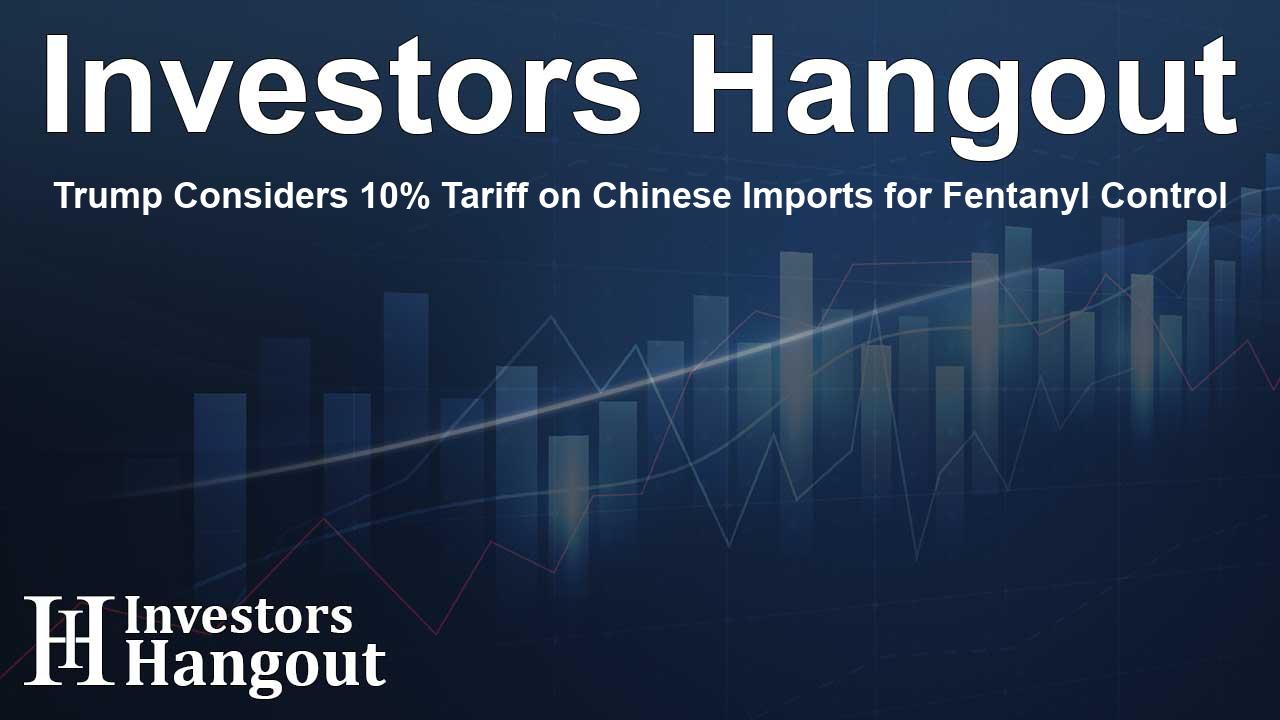Trump Considers 10% Tariff on Chinese Imports for Fentanyl Control

Trump's Proposal for Tariff on Chinese Goods
U.S. President Donald Trump has brought attention to a significant discussion regarding the implementation of a 10% tariff on goods imported from China. This proposal aims to address the concerning issue of fentanyl trafficking, which has been a significant challenge for the United States, particularly regarding its origins in China and its transportation through neighboring countries such as Mexico and Canada.
The Rationale Behind the Tariff
The proposed tariff reflects a broader strategy to mitigate the impact of illegal drugs entering the U.S. Furthermore, fentanyl, a potent synthetic opioid, has significantly contributed to the opioid crisis in the country. By imposing a financial penalty on Chinese imports, the administration aims to discourage the flow of this substance and enhance overall public safety.
Understanding Fentanyl's Impact
Fentanyl is known for being much stronger than both heroin and morphine, and its illicit use has surged over the past several years. The rise in fentanyl-related overdoses has prompted urgent responses from lawmakers and health officials alike. The President's proposed tariff is just one angle of a larger approach intended to tackle this public health crisis.
The Complexity of Trade and Tariff Policies
Implementing tariffs can be a complex process, often leading to discussions about trade relations and economic implications. While some argue that tariffs cushion domestic industries from foreign competition, others raise concerns regarding potential retaliatory measures from other countries, including China. Balancing these considerations is crucial as discussions about the tariff progress.
Looking Ahead: Potential Consequences
The impact of a potential tariff on Chinese imports might extend beyond the immediate goal of controlling fentanyl trafficking. Other sectors could feel the pressure of increased costs associated with imported goods, leading to price adjustments for consumers and businesses alike. The economic landscape could shift slightly as companies weigh the repercussions of such tariffs in their supply chains.
Conclusion and Next Steps
As discourse around the proposed 10% tariff continues, it's essential for stakeholders, from lawmakers to the public, to stay informed. The outcome of these discussions could shape future trade policies and health interventions aimed at combating the fentanyl crisis in the United States.
Frequently Asked Questions
What is the purpose of the proposed tariff on Chinese goods?
The purpose is to help combat fentanyl trafficking, which significantly affects the U.S. drug crisis.
How does fentanyl impact public health?
Fentanyl's potency makes it a major contributor to the opioid crisis, leading to increased overdoses and fatalities.
What could be the economic effects of the tariff?
Potential effects may include higher costs for consumers and shifts in the supply chain for businesses.
How might China respond to the proposed tariffs?
China may retaliate with its own tariffs or trade restrictions, complicating trade relations.
What other measures are being considered to address fentanyl trafficking?
In addition to tariffs, various law enforcement initiatives and public health campaigns are being explored.
About The Author
Contact Addison Perry privately here. Or send an email with ATTN: Addison Perry as the subject to contact@investorshangout.com.
About Investors Hangout
Investors Hangout is a leading online stock forum for financial discussion and learning, offering a wide range of free tools and resources. It draws in traders of all levels, who exchange market knowledge, investigate trading tactics, and keep an eye on industry developments in real time. Featuring financial articles, stock message boards, quotes, charts, company profiles, and live news updates. Through cooperative learning and a wealth of informational resources, it helps users from novices creating their first portfolios to experts honing their techniques. Join Investors Hangout today: https://investorshangout.com/
The content of this article is based on factual, publicly available information and does not represent legal, financial, or investment advice. Investors Hangout does not offer financial advice, and the author is not a licensed financial advisor. Consult a qualified advisor before making any financial or investment decisions based on this article. This article should not be considered advice to purchase, sell, or hold any securities or other investments. If any of the material provided here is inaccurate, please contact us for corrections.
